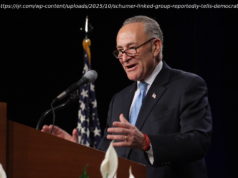The U. S. Supreme Court ruled Wednesday that public sector unions cannot force some 5 million government workers to pay mandatory fees. A five-justice…
The U. S. Supreme Court ruled Wednesday that public sector unions cannot force some 5 million government workers to pay mandatory fees.
A five-justice majority led by Justice Samuel Alito found the practice violates the Constitution.
“Compelling individuals to mouth support for views they find objectionable violates that cardinal constitutional command, and in most contexts, any such effort would be universally condemned,” Alito wrote in the majority opinion .
“This is the biggest victory for workers’ rights in a generation,” said Jacob Huebert, an attorney for the plaintiff. “The First Amendment guarantees each of us, as individuals, the right to choose which groups we will and won’t support with our money. Today the Supreme Court recognized that no one should be forced to give up that right just to be allowed to work in government.”
A 1977 Supreme Court precedent called Abood v. Detroit Board of Education allows public sector unions to collect administrative fees from government workers to cover the cost of collective bargaining. Many state and local governments designate a single union as their exclusive bargaining partner, meaning all public employees are bound by the contractual agreements labor leaders reach with public officials.
These so-called agency fees protect union shops from the free-rider problem, in which non-unionized workers enjoy the benefits of membership without enrolling in a union.
Abood also provides that agency fees may only be used for contract negotiations. They cannot finance political expenditures. (RELATED: Supremes Say California Law Making Pro Life Groups Promote Abortion Is Unconstitutional)
The decision has long been something of a pet peeve to conservative jurists, who argue it draws a meaningless distinction. As they see it, collective bargaining is an inherently political process, meaning government workers are made to subsidize speech with which they may disagree, in violation of the First Amendment.
Wednesday’s case was occasioned when a child support specialist in the Illinois Department of Healthcare and Family, Mark Janus, brought a suit against the American Federation of State, County, and Municipal Employees (AFSCME), which deducts a fee from his monthly paycheck.
Alito forcefully rejected Abood’s typical justifications — the maintenance of labor peace and the free rider problem. The decision concludes that longstanding fears of disorder and union rivalry have proved unfounded as time progressed. What’s more labor’s duty to represent nonmembers in contract negotiations does not depend on agency fees, as evidenced by numerous jurisdictions where forced fees are not collected.
Justice Elena Kagan led the liberal bloc in dissent, blasting the high court for using the First Amendment to dismantle “workaday economic and regulatory policy.” She predicted a grim future for the country should the Court continue to use speech as a basis for invalidating longstanding practices.
“Speech is everywhere — a part of every human activity,” Kagan wrote. “For that reason, almost all economic and regulatory policy affects or touches speech. So the majority’s road runs long. And at every stop are black-robed rulers overriding citizens’ choices.”
“The First Amendment was meant for better things,” she added.
This is breaking news. Check back for updates.
Follow Kevin on Twitter
Send tips to kevin@dailycallernewsfoundation.org .






